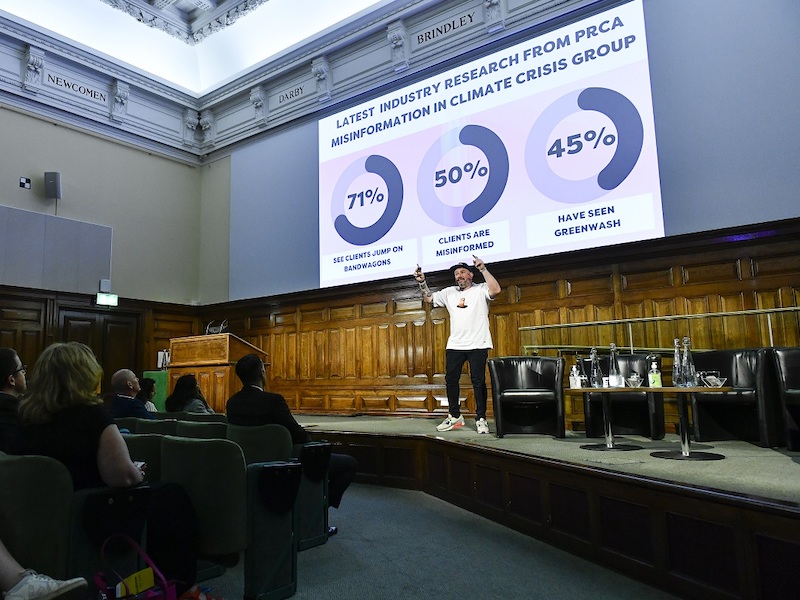Maja Pawinska Sims 14 Jul 2022 // 2:28PM GMT

LONDON — Almost half of PR professionals have seen clients or their own organisation attempting to greenwash, but 89% have pushed back and 57% have managed to change the approach, according to new research.
The second annual report from the PRCA Climate Misinformation Strategy Group and Opinium reveals an industry increasingly confident in its ability to guide organisations towards meaningful action on climate issues, and shows evidence of the industry’s growing confidence in calling out climate mistruths.
The study of more than 200 UK PR and communications professionals – conducted six months on from COP26 – explored the attitudes and perceptions of practitioners towards the climate crisis.
Nearly all (96%) PR professionals now advise their clients and colleagues on the climate crisis and how they can effectively communicate the part they play, up from 82% last year.
John Brown, the founder of brand activism agency Don’t Cry Wolf and leader of the Climate Misinformation Strategy Group, went through the results of the survey – and the role of communicators – at last week’s PRCA UK conference. He said: “It’s not good enough anymore to be involved in campaigns, activities or endeavours that are superficial and surface-level. It’s not good enough to just put it on a billboard. We are sincerely running out of time; we do not need more bamboo coffee cups. We need genuine work, genuine activity, genuine systemic change. Clients jumping on an eco or greenwashing bandwagon is distracting from important work that needs to happen.
“It’s great that most comms pros are pushing back on greenwashing ideas from clients, but that needs to be 100%. We need to get knowledge, get brave and step away from the sexy to do stuff that’s important.”
The research also found PR professionals continue to face challenges in helping organisations move beyond intent towards action; only 24% of organisations set science-based targets and 59% do not measure carbon footprints.
Brown said: “We can’t fix what we haven’t measured. I am tired of seeing sustainability plans, ESG commitments and breathless net zero commitments. Nearly 60% of PR professionals said they don’t do carbon footprinting for themselves or clients, but how many have made huge sweeping declarations around what doing to the climate crisis? If you don’t know what the problem is, how do you solve it? If you do one thing, as your business or for your client, find out what your carbon footprint is. We need more science-based targets.”
In a complementary study of 2,000 nationally representative UK adults, also conducted by Opinium, 57% of consumers admitted to not knowing the outcome of COP26, with a third believing its agreements had no effect on them.
Data from the consumer report also shows 31% of the public consider poverty to be the most pressing issue and only half (50%) believe the planet faces an existential threat due to the man-made climate crisis.
“We’ve been going too big,” said Brown. “We talk about global emissions, enormous shifts, systemic change away from coal, but we need to go more community-based, make it more individual and personal, about what matters to people every day, because it’s not getting through. People’s number one concern is poverty, and our number one problem as a climate movement is that we forgot to link the two. If you help people live better, their positive environment impact will begin to rise. We’ve created a middle-class, comfortable activism movement and forgotten that the vast majority of the people who will be impacted by the climate crisis live in the Global South – and we haven’t brought them in on the conversation.”
And Brown urged PR professionals to accelerate their understanding of the science behind tackling the climate crisis: “Invest in your knowledge, as a comms industry we are advising clients on issues to do with climate crisis, so we have to know what we are talking about. About half of our clients are misinformed about the climate crisis. Most struggle to get their heads round scope 1, 2 and 3 emissions, which is an important thing when you’re considering carbon as a whole.
“We need to get to grips with the detail, because our job is to take scientific, inaccessible, global issues and make them human, personalised community focused. Use your creativity: 84% say more needs to be done on climate misinformation, and our role is to tackle that.”
PRCA Climate Misinformation Strategy Group member Laura Sutherland, the founder of ESG-focused agency Aura, added: “We have a responsibility to ensure any unethical communication or attempts are challenged. The call to action to industry is this: be more brave – learn about ESG, learn how to approach a difficult situation with your boss or your client, start setting your own agency targets and communicate the action you’re taking.
“We know we’re not doing enough to make it all relatable at a grassroots level. People need to hear the same accurate messages about climate change over and over again in order for it to have a lasting impact."



































.jpg)

















